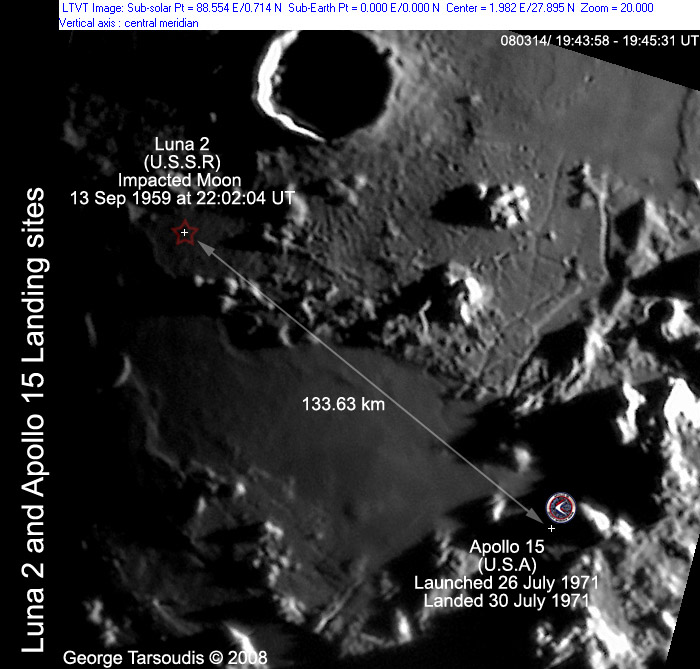Difference between revisions of "LPOD Apr 8, 2008"
(Created page with "<div id="content_view" class="wiki" style="display: block"> =FIRST AND ALMOST LAST= LPOD-Apr8-08.jpg<br /> ''image by [mailto:g.tarsoudis@freemail...") |
|||
| (One intermediate revision by the same user not shown) | |||
| Line 3: | Line 3: | ||
[[Image:LPOD-Apr8-08.jpg|LPOD-Apr8-08.jpg]]<br /> ''image by [mailto:g.tarsoudis@freemail.gr George Tarsoudis], Alexandroupolis, Greece''<br /> <br /> Humanity's first and one of its last human contacts with the Moon occurred in the area captured in this image. Apollo 15 did land a crew of lucky astronauts near Hadley Rille in late July, 1971; only Apollo 16 and 17, Luna 18 to 24, Lunar Prospector, SMART-1 and Hitan have touched the Moon since. That list seems long but the last three missions touched the Moon the way Luna 2 did, as high speed impacts. George points out that the distance between Luna 2 and Apollo 15 is about the same as separates New York and Philadelphia. That is true for the nominal crash site for Luna 2 but it may have actually hit the Moon much closer to Apollo 15. In his ''International Atlas of Lunar Exploration'' Phil Stooke suggests that reported observations of a dark dust cloud imply the crash was near the small crater where the mountain shadow touches the line in this image. If so the distance between the future Apollo 15-Luna 2 Museum end points may be only 38 km, a little less than the distance between Alexandroupolis and Komotini, in the part of Greece that George calls home.<br /> <br /> ''Chuck Wood''<br /> <br /> '''Technical Details'''<br /> see image<br /> <br /> '''Related Links'''<br /> Rükl plate 22<br /> George's [http://www.lunar-captures.com/ website]<br /> <br /> | [[Image:LPOD-Apr8-08.jpg|LPOD-Apr8-08.jpg]]<br /> ''image by [mailto:g.tarsoudis@freemail.gr George Tarsoudis], Alexandroupolis, Greece''<br /> <br /> Humanity's first and one of its last human contacts with the Moon occurred in the area captured in this image. Apollo 15 did land a crew of lucky astronauts near Hadley Rille in late July, 1971; only Apollo 16 and 17, Luna 18 to 24, Lunar Prospector, SMART-1 and Hitan have touched the Moon since. That list seems long but the last three missions touched the Moon the way Luna 2 did, as high speed impacts. George points out that the distance between Luna 2 and Apollo 15 is about the same as separates New York and Philadelphia. That is true for the nominal crash site for Luna 2 but it may have actually hit the Moon much closer to Apollo 15. In his ''International Atlas of Lunar Exploration'' Phil Stooke suggests that reported observations of a dark dust cloud imply the crash was near the small crater where the mountain shadow touches the line in this image. If so the distance between the future Apollo 15-Luna 2 Museum end points may be only 38 km, a little less than the distance between Alexandroupolis and Komotini, in the part of Greece that George calls home.<br /> <br /> ''Chuck Wood''<br /> <br /> '''Technical Details'''<br /> see image<br /> <br /> '''Related Links'''<br /> Rükl plate 22<br /> George's [http://www.lunar-captures.com/ website]<br /> <br /> | ||
---- | ---- | ||
| − | '''COMMENTS'''<br /> To [ | + | '''COMMENTS'''<br /> To [[LPOD%20Comments|post comments]] regarding this LPOD, please click [http://the-moon.us/wiki/page/edit/LPOD%20Apr%208%2C%202008 here] and enter your text in the space below. You will not see the Edit tab unless you register for the wiki. ''Please do not edit the LPOD itself!''<br /> <br /> <br /> <br /> |
---- | ---- | ||
| − | + | </div> | |
Latest revision as of 14:54, 15 April 2018
FIRST AND ALMOST LAST

image by George Tarsoudis, Alexandroupolis, Greece
Humanity's first and one of its last human contacts with the Moon occurred in the area captured in this image. Apollo 15 did land a crew of lucky astronauts near Hadley Rille in late July, 1971; only Apollo 16 and 17, Luna 18 to 24, Lunar Prospector, SMART-1 and Hitan have touched the Moon since. That list seems long but the last three missions touched the Moon the way Luna 2 did, as high speed impacts. George points out that the distance between Luna 2 and Apollo 15 is about the same as separates New York and Philadelphia. That is true for the nominal crash site for Luna 2 but it may have actually hit the Moon much closer to Apollo 15. In his International Atlas of Lunar Exploration Phil Stooke suggests that reported observations of a dark dust cloud imply the crash was near the small crater where the mountain shadow touches the line in this image. If so the distance between the future Apollo 15-Luna 2 Museum end points may be only 38 km, a little less than the distance between Alexandroupolis and Komotini, in the part of Greece that George calls home.
Chuck Wood
Technical Details
see image
Related Links
Rükl plate 22
George's website
COMMENTS
To post comments regarding this LPOD, please click here and enter your text in the space below. You will not see the Edit tab unless you register for the wiki. Please do not edit the LPOD itself!